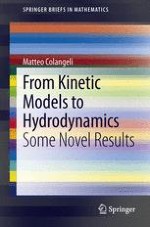2013 | OriginalPaper | Chapter
5. Hydrodynamic Fluctuations from the Boltzmann Equation
Author : Matteo Colangeli
Published in: From Kinetic Models to Hydrodynamics
Publisher: Springer New York
Activate our intelligent search to find suitable subject content or patents.
Select sections of text to find matching patents with Artificial Intelligence. powered by
Select sections of text to find additional relevant content using AI-assisted search. powered by




